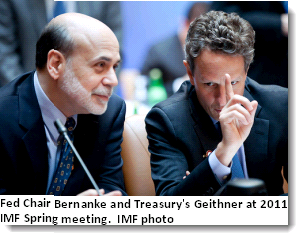Originally published on The Agonist

It took a while, but the financial markets are starting to realize that Quantitative Easing will end next month, possibly once and for all. The unprecedented amount of monetary stimulus being pumped into the global economy by the Federal Reserve will come to a sudden halt. Commodity markets have enjoyed a bubbly expansion since the QE2 program was announced, and they were the first to crumble when the Fed began removing the monetary supports. Stock markets are now slowly beginning to follow suit.
One reason the markets took the news sanguinely was because the Fed engineered it that way. After the May meeting of the Fed Open Market Committee, at which it was decided not to renew QE2 when it expires in June, Ben Bernanke gave a first-ever press conference by a Fed Chairman following an FOMC meeting. The media thought it was a masterful performance – which it was, but not for the reasons cited in the press. Bernanke made it sound as if the end of Quantitative Easing was the most natural thing in the world, and that all the voting members of the FOMC agreed with him. The fact is, the FOMC decision was a defeat for Bernanke and his allies, which included the two other officers of the FOMC, Janet Yellen (Vice Chair of the Fed Board) and William Dudley (NY Fed President). Dudley, just a week before the meeting, had gone public with his desire to have a QE3 program standing by, ready to aid a struggling economy.
Recent comments